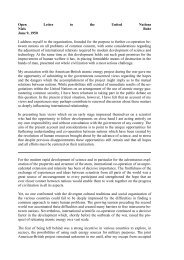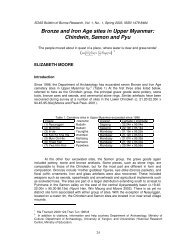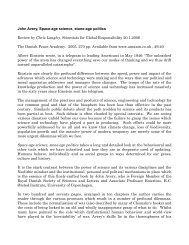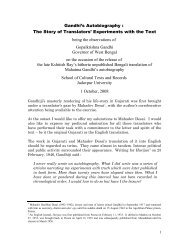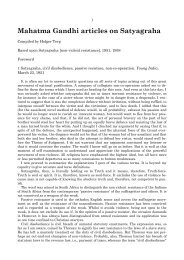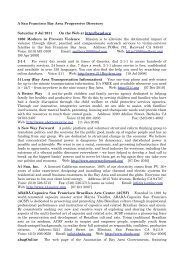THE SLAVERY OF OUR TIMES PREFACE / INTRODUCTION
THE SLAVERY OF OUR TIMES PREFACE / INTRODUCTION
THE SLAVERY OF OUR TIMES PREFACE / INTRODUCTION
You also want an ePaper? Increase the reach of your titles
YUMPU automatically turns print PDFs into web optimized ePapers that Google loves.
twelve hours a day, at the looms amid a deafening roar; winding, unwinding,<br />
arranging the silk threads to make silk stuffs. All the women (except those who have<br />
just come from the villages) have an unhealthy appearance. Most of them lead a most<br />
intemperate and immoral life. Almost all, whether married or unmarried, as soon as a<br />
child is born to them send it off either to the village or to the Foundlings' Hospital,<br />
where eighty per cent of these children perish. For fear of losing their places the<br />
mothers resume work the next day, or on the third day after their confinement.<br />
So that during twenty years, to my knowledge, tens of thousands of young, healthy<br />
women-mothers-have ruined and are now ruining their lives and the lives of their<br />
children in order to produce velvets and silk stuffs.<br />
I met a beggar yesterday, a young man on crutches, sturdily built, but crippled. He<br />
used to work as a navvy, with a wheelbarrow, but slipped and injured himself<br />
internally. He spent all he had on peasant-women healers and on doctors, and has now<br />
for eight years been homeless, begging his bread, and complaining that God does not<br />
send him death.<br />
How many such sacrifices of life there are that we either know nothing of, or know of,<br />
but hardly notice, considering them inevitable!<br />
I know men working at the blast-furnaces of the Tula Iron Foundry who, to have one<br />
Sunday free each fortnight, will work for twenty-four hours-that is, after working all<br />
day they will go on working all night. I have seen these men. They all drink vodka to<br />
keep up their energy, and obviously, like those goods-porters on the railway, they<br />
quickly expend not the interest, but the capital of their lives.<br />
And what of the waste of lives among those who are employed on admittedly harmful<br />
work, in looking-glass, cartridge, match, sugar, tobacco, and glass factories; in mines<br />
or as gilders?<br />
There are English statistics showing that the average length of life among people of<br />
the upper classes is fifty- five years, and the average of life among working people in<br />
unhealthy occupations is twenty-nine years.<br />
Knowing this (and we cannot help knowing it), we who take advantage of labor that<br />
costs human lives should, one would think (unless we are beasts), not be able to enjoy<br />
a moment's peace. But the fact is that we well-to-do people, liberals and<br />
humanitarians, very sensitive to the sufferings not of people only, but also of animals,<br />
unceasingly make use of such labor, and try to become more and more rich-that is, to<br />
take more and more advantage of such work. And we remain perfectly tranquil.<br />
For instance, having learned of the thirty-seven-hour labor of the goods-porters, and of<br />
their bad room, we at once send there an inspector, who receives a good salary, and we<br />
forbid people to work more than twelve hours, leaving the workmen (who are thus<br />
deprived of one-third of their earnings) to feed themselves as best they can; and we<br />
compel the railway company to erect a large and convenient room for the workmen.<br />
Then with perfectly quiet consciences we continue to receive and dispatch goods by<br />
that railway, and we ourselves continue to receive salaries, dividends, rents from<br />
houses or from land, etc. Having learned that the women and girls at the silk factory,





